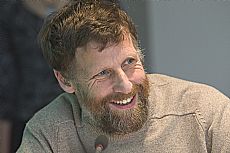A CONFERENCE TO CHANGE THE WORLD?
01 November 2010
 THE relationships between locals, incomers and land in communities throughout Scotland and beyond will be explored in a groundbreaking conference later this month.
THE relationships between locals, incomers and land in communities throughout Scotland and beyond will be explored in a groundbreaking conference later this month.
Building vibrant communities deeply rooted in the places they live is crucial in adapting to life beyond oil. This theme will be at the heart of the two-day event ‘Transitions: Diverse Routes to Belonging’ which will feature author and activist Alastair McIntosh and Rob Hopkins, co-founder of the worldwide Transition movement, among others.
People who are working in Transition initiatives or interested in building resilience in their communities, will gather for the International Transition Conference at Pollock Halls in Edinburgh on 20 and 21 November. Delegates will investigate how the challenges brought by looming energy shortages and climate change can be tackled by encouraging creative, collaborative ways of living.
The event has been organised by Transition Scotland Support and the Transition Network, which support local groups working to help their communities adapt to a future without fossil fuels. Transition Edinburgh University is the host organisation.
“Oil has become the lifeblood of how we feed, entertain and house ourselves - it’s what makes our modern lifestyles possible,” said Rob Hopkins, author of the Transition Handbook. “We are now entering the end of the age of cheap oil. That coupled with the climate change agenda means we have to rethink some very basic assumptions about how we live.”
As well as taking practical steps, such as producing food locally and introducing currencies and trading systems to enable local economies to flourish, the Transition model recognises work to build cohesion in fragmented communities as being central to making them fit to face the future.
This chimes fundamentally with the thinking which sparked land reform in Scotland in the 1990s. Alastair McIntosh was at the forefront of this historic movement, most famously in the run up to the landmark community buyout of the island of Eigg 13 years ago.
“The rekindling of community is the most important form of transition that we collectively face in the world,” he said.
“That raises the question as to how we get on with each other when we are from so many backgrounds, both native and non-native.
“We must therefore ask whether it is possible to reground ourselves in becoming indigenous no matter where we are from and where we live.”
The two day international event will be preceeded by the Scottish National Transition Gathering on Friday 19 November.
For further information and to book a place go to to www.transitionscotland.org
Some funding is available to enable Transition Black Isle members to attend - please e-mail us to find out more.
Notes to editors:
1) For further information and high resolution pictures of the speakers contact Catriona Ross on 0782 4531942. Members of the media wishing to attend the conference should e-mail the organisers.
2) Further information on Transition worldwide see http://www.transitionnetwork.org/
3) Alastair McIntosh is a Professor of the Centre for Human Ecology and author of number of studies and books, including Soil and Soul: People versus Corporate Power and Hell and High Water: Climate Change, Hope and the Human Condition. For further information see www.alastairmcintosh.com
Latest News Stories
- 08/09/2024 Welcome for proposed Natural Environment Bill
- 06/09/2024 Wind Farm proposal for Cnoc Ceislein
- 04/09/2024 Scottish Human Rights Bill omitted from programme for government
- 02/09/2024 Highland Council adopts Circular Economy policy
- 24/08/2024 Transition UK project hit by funding blow
- 16/08/2024 Highlands & Islands Climate Festival continues through September
- 14/08/2024 Rewilding information and events
- 06/08/2024 12 August was UN International Youth Day
- 05/08/2024 The GALE Centre Wins TripAdvisor Travellers’ Choice Award
- 04/08/2024 Wealthy western countries lead in global oil and gas expansion
Forthcoming Events…
- Saturday 12 October
- 10:30 Cromarty Community Market
- Tuesday 15 October
- 18:00 Zero Food Waste Challenge - Growing & Storing Your Own Food
- Saturday 19 October
- 10:00 Culbokie Community Market
- Tuesday 22 October
- 18:00 Zero Food Waste Challenge - Fermenting & Pickling Workshop
- Saturday 26 October
- 16:00 Halloween on the Green at Culbokie
- 10:00 North Kessock Community market
- Tuesday 29 October
- 18:00 Zero Food Waste Challenge - Cooking With Leftovers
- Tuesday 5 November
- 18:00 Zero Food Waste Challenge - Composting Workshop
Events to add to calendar? Contact Us.
